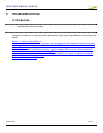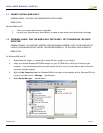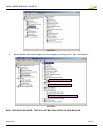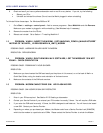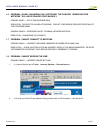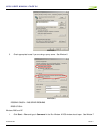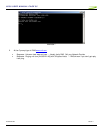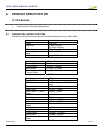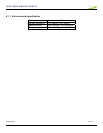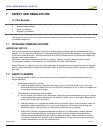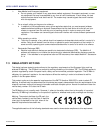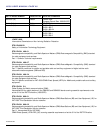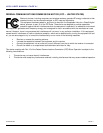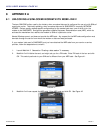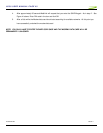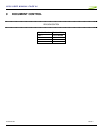
U
U
6
6
3
3
0
0
U
U
S
S
E
E
R
R
M
M
A
A
N
N
U
U
A
A
L
L
P
P
A
A
G
G
E
E
3
3
8
8
GU-90023610GU Revision 1
7 SAFETY AND REGULATIONS
In This Section
• Wireless Communication
• Safety and Hazards
• Regulatory Information
This section will inform you of the important safety measures you should be aware, including the standards that
the modem complies to.
7.1 WIRELESS COMMUNICATIONS
IMPORTANT NOTICE
Due to the transmission and reception properties of wireless communications, data can occasionally be lost or
delayed. This can be due to the variation in radio signal strength that results from changes in the characteristics
of the radio transmission path. Although data loss is rare, the environment where you operate the modem may
adversely affect communications.
Variations in radio signal strength are referred to as fading. Fading is caused by several different factors
including signal reflection, the ionosphere, and interference from other radio channels.
Novatel Wireless or its partners will not be held responsible for damages of any kind resulting from the delays or
errors in data transmitted or received with the Merlin U630, or failure of the Merlin U630 to transmit or receive
such data
7.2 SAFETY HAZARDS
Do not operate the Merlin U630 in an environment that may be susceptible to radio interference resulting in
danger specifically;
¾ Areas where prohibited by the law
o Follow any special rules and regulations and obey all signs and notices. Always turn off the host
device and remove the modem from the card slot when instructed to do so, or when you suspect that
it may cause interference or danger.
¾ Where explosive atmospheres may be present
o Do not operate your modem in any area where a potentially explosive atmosphere may exist. Sparks
in such areas could cause an explosion or fire resulting in bodily injury or even death. Be aware and
comply with all signs and instructions.
o Users are advised not to operate the modem while at a refuelling point or service station. Users are
reminded to observe restrictions on the use of radio equipment in fuel depots (fuel storage and
distribution areas), chemical plants or where blasting operations are in progress.
o Areas with a potentially explosive atmosphere are often but not always clearly marked. Potential
locations can include gas stations, below deck on boats, chemical transfer or storage facilities,
vehicles using liquefied petroleum gas (such as propane or butane), areas where the air contains
chemicals or particles, such as grain, dust or metal powders, and any other area where you would
normally be advised to turn off your vehicle engine.



